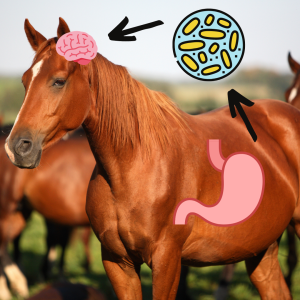Our understanding of the significance of the microbiome (organisms of the gastrointestinal tract) has blossomed over the last few decades. The knowledge of the role of gastrointestinal bacteria is growing beyond the nutritional aspects of digestion and production of micronutrients and into its relationship with the brain and behavior. The gut microflora contributions include the development of the immune system, local defense against gastrointestinal pathogens, response to allergens, modulation of inflammation and most recently communication with the central nervous system. This communication is known as gut-brain axis.
The gut-brain axis is being studied in many different mammals. A recent manuscript (1) associated physical and mental stress to changes in the GI flora in the horse. This work reveals the importance of gut microbial flora to equine behavior. Behaviors evaluated during times of stress included aggression, withdrawn postures, cribbing, weaving and head bobbing. Work in other species has identified a role of GI flora influencing behaviors such as anxiety, depression and an autism-like syndrome (2,3,4,5). Lactobacillus reuteri, a beneficial bacteria found naturally in mammals, has been identified as a component of this research. Our equine probiotic, EquiOtic, contains live, equine sourced lactobacillus reuteri.
Concluding: The gastrointestinal flora is increasing as a non-nutritional consideration in horse health. Lactobacillus reuteri has previously been documented to influence numerous areas of animal health; development of the immune system, gastrointestinal infection, gastric ulceration and the inflammatory response. The gut brain axis is an additional health benefit that can be added to the growing list of Lactobacillus Reuteri health benefits.
- Mach, N., Ruet, A., Clark, A. et al. Priming for welfare: gut microbiota is associated with equitation conditions and behavior in horse athletes. Sci Rep 10, 8311 (2020). https://doi.org/10.1038/s41598-020-65444-9
- Carabotti, Marilia et al. “The gut-brain axis: interactions between enteric microbiota, central and enteric nervous systems.” Annals of gastroenterology vol. 28,2 (2015): 203-209.
- Foster JA, McVey Neufeld KA. Gut-brain axis: how the microbiome influences anxiety and depression. Trends Neurosci. 2013 May;36(5):305-12. doi: 10.1016/j.tins.2013.01.005. Epub 2013 Feb 4. PMID: 23384445.
- Naseribafrouei A, Hestad K, Avershina E, Sekelja M, Linløkken A, Wilson R, Rudi K. Correlation between the human fecal microbiota and depression. Neurogastroenterol Motil. 2014 Aug;26(8):1155-62. doi: 10.1111/nmo.12378. Epub 2014 Jun 1. PMID: 24888394.
- Sgritta M, Dooling SW, Buffington SA, Momin EN, Francis MB, Britton RA, Costa-Mattioli M. Mechanisms Underlying Microbial-Mediated Changes in Social Behavior in Mouse Models of Autism Spectrum Disorder. Neuron. 2019 Jan 16;101(2):246-259.e6. doi: 10.1016/j.neuron.2018.11.018. Epub 2018 Dec 3. PMID: 30522820; PMCID: PMC6645363.

